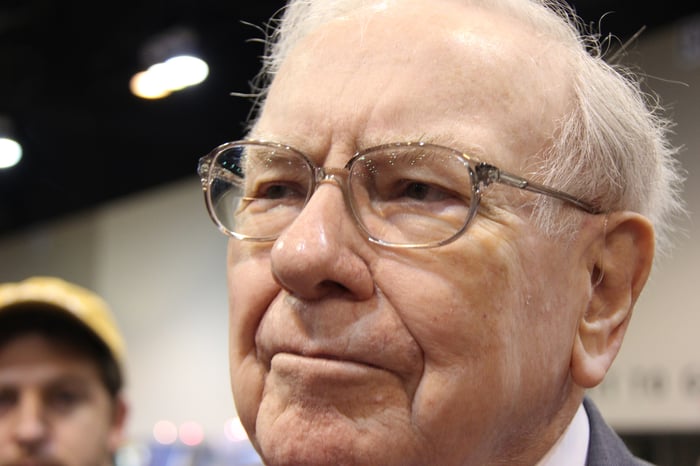Few people garner attention from everyday and professional investors quite like Berkshire Hathaway (BRK.A -0.34%) (BRK.B -0.01%) CEO Warren Buffett. Despite being fallible like every other investor, the Oracle of Omaha has outpaced the total return, including dividends, of the benchmark S&P 500 by a factor of 153 since becoming CEO in the mid-1960s -- a 3,787,464% return for Berkshire's Class A shares (BRK.A), versus 24,708% for the S&P 500, as of Dec. 31, 2022.
Buffett's not-so-subtle secrets to success are aplenty. He has a relatively narrow research focus, tends to buy profitable, dividend-paying, time-tested businesses, and prefers to hold those positions for long periods. But the factor that might be most responsible for Berkshire Hathaway's outperformance is portfolio concentration. Buffett has long believed that diversification is only necessary if you don't know what you're doing.

Berkshire Hathaway CEO Warren Buffett. Image source: The Motley Fool.
As of the closing bell on April 4, 2023, Warren Buffett and his team oversaw a $342 billion investment portfolio containing 49 securities (47 stocks and two exchange-traded funds). A whopping 53% of Buffett's portfolio was tied up in just two stocks, even though Buffett had a boatload of capital to work with. (Note, this figure includes assets from the Oracle of Omaha's secret portfolio, New England Asset Management.)
Apple: $151,644,266,071 (44.4% of invested assets)
There's absolutely no question that Warren Buffett enjoys running a relatively concentrated portfolio, once you take a closer look at Berkshire Hathaway's stake in tech-stock Apple (AAPL 0.64%). Labeled as one of Berkshire's "four giants" by the Oracle of Omaha in his 2021 letter to shareholders, Apple is closing in on a 45% weighting within Berkshire's portfolio.
Apple checks all the right boxes for the long-term-minded Warren Buffett. For starters, it's one of the most well-known companies in the world and has quite the loyal customer base. Interbrand has labeled Apple the world's most valuable brand for 10 years running, while Kantar BrandZ announced last year that, based on its survey, Apple had reclaimed the top spot in brand value.
The company's products are also well-loved. Since late 2020, which is when Apple's first 5G iPhone hit sales floors, the company has accounted for around 50% of all U.S. smartphone market share.
Likewise, Apple's share of U.S. personal computer (PC) shipments is on the rise. The 17.2% share of the PC market that the company's Mac computers claimed in the fourth quarter of 2022 was a decade high.
However, Berkshire's $151.6 billion stake in Apple is also a reflection of Warren Buffett implicitly trusting Apple's CEO Tim Cook. While not abandoning the physical products that made Apple what it is today, Cook is leading an ongoing shift to a subscription-driven operating model.
Focusing on services should help Apple generate predictable, high-margin revenue. Further, it'll help minimize the revenue ebbs and flows that are often observed during iPhone replacement cycles.
But the biggest lure of all might just be Apple's capital-return program. In terms of nominal dollars, the nearly $14.6 billion Apple doles out in dividends each year to its shareholders is one of the largest payouts on the planet. The company has also repurchased well over $550 billion worth of its common stock over a 10-year period. These buybacks are growing Berkshire's stake in Apple without Buffett's company lifting a finger.
There's no question Apple has been a phenomenal investment for Warren Buffett and his team. But with its growth engine stalled and its valuation inflated, relative to where it was even five years ago, I believe it's fair to suggest that Apple isn't very attractive at its current price.

Image source: Getty Images.
Bank of America: $28,899,199,128 (8.5% of invested assets)
The other top holding that collectively accounts for 53% of invested assets in Berkshire Hathaway's portfolio is Bank of America (BAC 1.70%). Inclusive of Buffett's secret portfolio, Berkshire holds more than 1.03 billion shares of BofA.
Of all the sectors and industries the Oracle of Omaha can invest in, there's arguably none he understands better than banking. In particular, Buffett appreciates the cyclical nature of the industry.
Cyclical stocks operate in lockstep with the U.S. or global economy. They thrive during economic expansions and struggle during contractions. But even though recessions are an inevitable part of the economic cycle, they're usually short-lived. Every recession after World War II has lasted just two to 18 months.
Comparatively, expansions are often measured in years. Buffett and his investing lieutenants, Ted Weschler and Todd Combs, are leaning on history and allowing their cyclical stocks to benefit from these long-winded expansions. There's no need to time the market when bull markets are disproportionately longer to begin with.
However, Warren Buffett wouldn't be holding a $28.9 billion stake in Bank of America if there weren't company-specific catalysts, as well. Perhaps the biggest of these is the company's interest-rate sensitivity.
As a general rule, bank stocks benefit when the Federal Reserve raises interest rates. Lending institutions with outstanding variable-rate loans should enjoy an increase in net interest income when rates climb.
Under normal conditions, the nation's central bank would be cutting rates in response to a weaker economy or a bear market for equities. But with the U.S. inflation rate coming off four-decade highs in June 2022, the Fed has little choice but to tackle its most pressing issue. As rates continue to rise, no money-center bank is reaping the benefit more than Bank of America.
Something else you might not realize about BofA is that it's done an admirable job of incorporating technology into the banking experience. As of the end of 2022, it had 44 million digital users, and its members were completing just shy of half of all loan sales online or via a mobile app. Additionally, 63 million more digital Zelle payments were sent during the fourth quarter than checks were written. Digital transactions are notably more cost-effective than in-person interactions for banks.
Lastly, it's pretty evident Warren Buffett trusts BofA CEO Brian Moynihan. On top of fortifying Bank of America's balance sheet following the Great Recession, Moynihan and BofA's board haven't been shy about rewarding their faithful shareholders. Between dividends and share buybacks, it's not out of the ordinary for Bank of America to return in excess of $20 billion annually to its shareholders when the U.S. economy is expanding.





